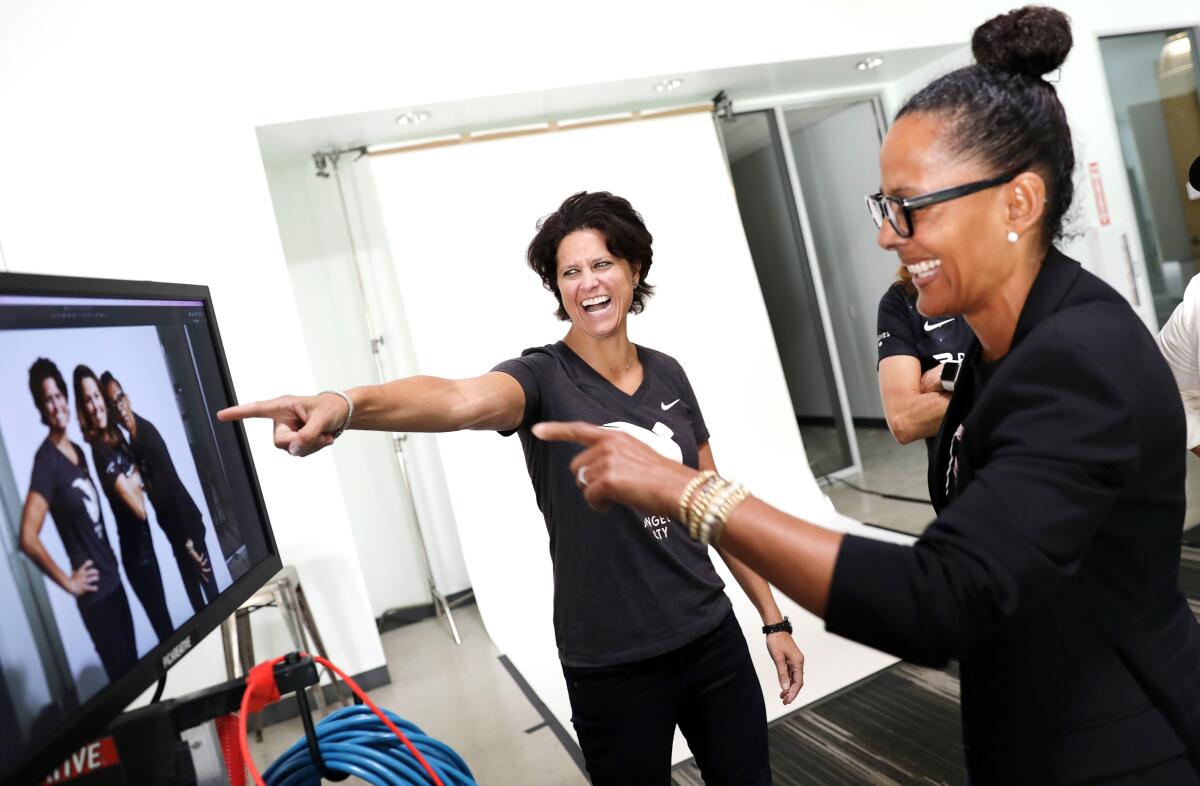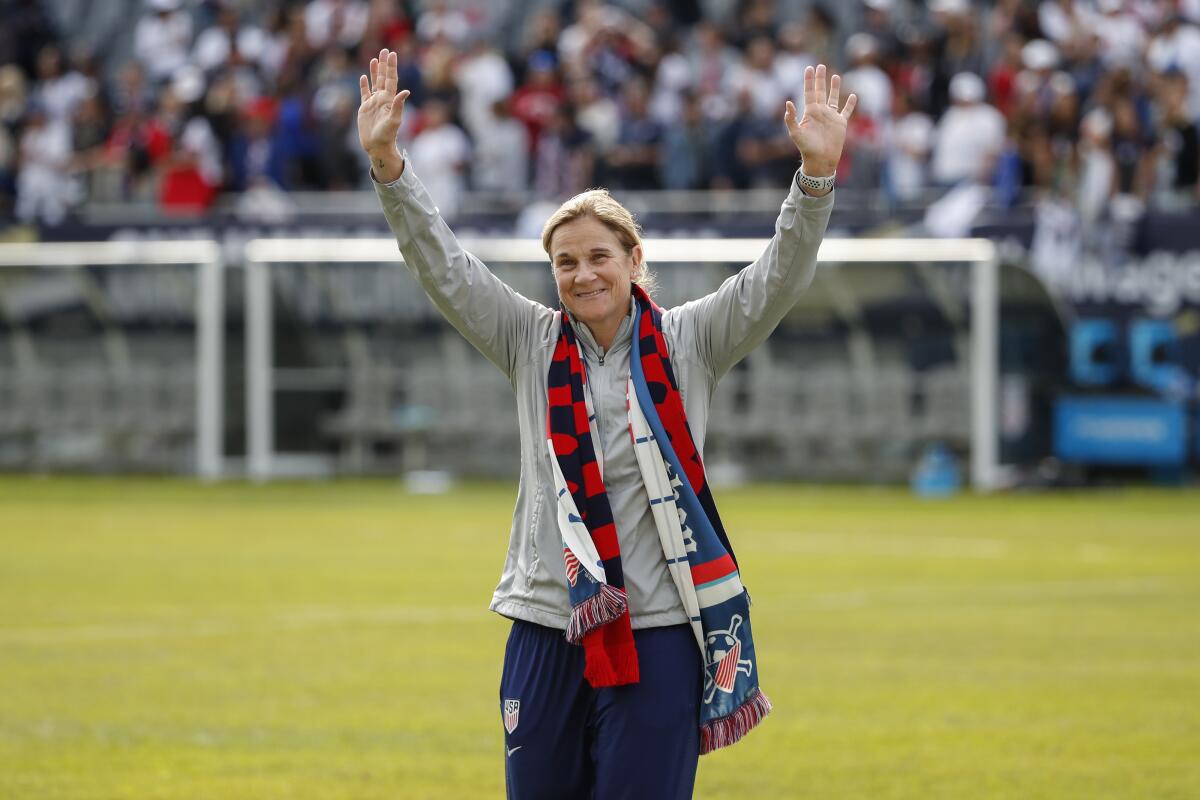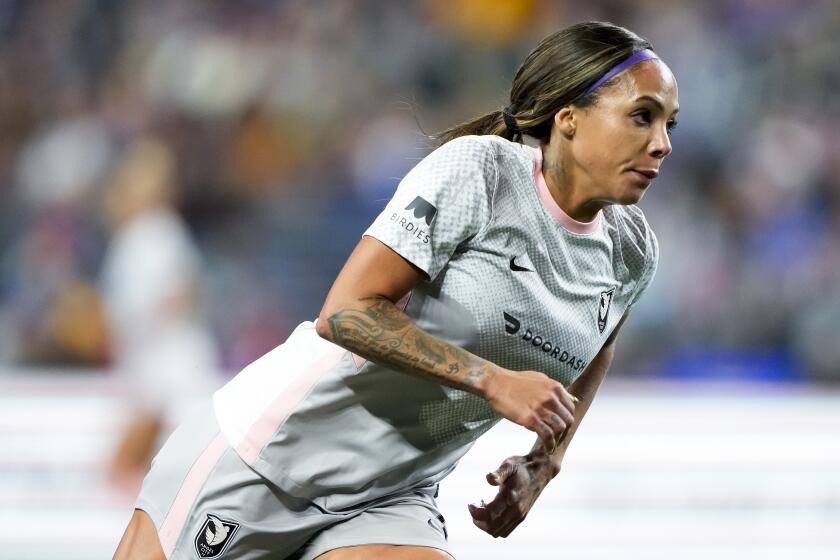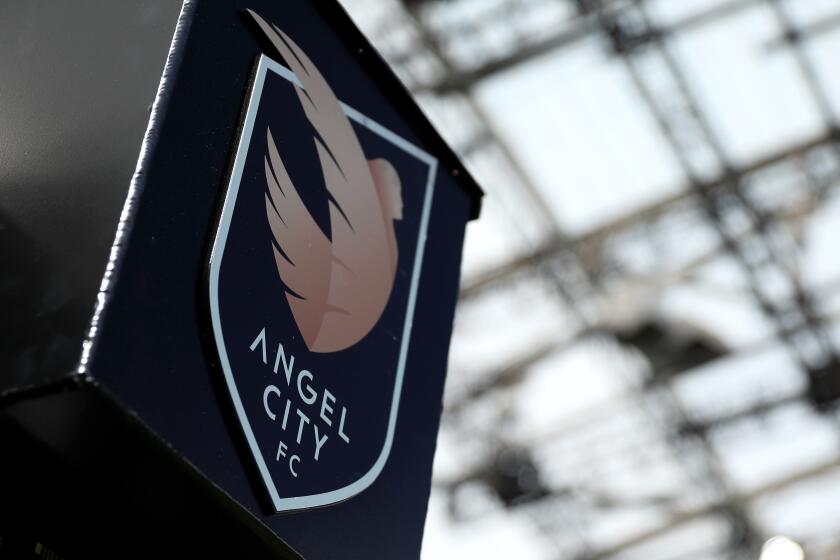Angel City and San Diego Wave are rivals on the pitch and strong collaborators off it

- Share via
In just three years, the NWSL rivalry between Angel City and the San Diego Wave has grown into one of the league’s most passionate. It’s one that reaches all the way to the owners’ suites, which is why San Diego’s Jill Ellis and Angel City’s Julie Uhrman, the two club presidents, will exchange pleasantries but little else before the team’s meet Thursday at BMO Stadium.
“There’s a nice hug before the game. Then there’s not a lot of talking,” Uhrman said. “We’re both incredibly competitive.”
During the 50 weeks a year their clubs aren’t playing each other, however, Ellis and Uhrman are incredibly cooperative. And that collaboration is not only a big reason why Sportico ranks Angel City and the Wave as the two most valuable franchises in the league, but also setting an example for other NWSL teams to emulate.
“In order for the league to succeed, everybody needs to be successful,” said Uhrman, who said she speaks with Ellis almost daily. “We wanted San Diego to come into the league at the high bar that we were setting for ourselves, which would then hopefully drive interest and excitement in the league. Not only for our fans, but also push other owners to build an experience that these women deserve.”
Goals from Sydney Leroux and Claire Emslie lift Angel City to a 2-1 win over the Utah Royals for their third win in four games.
The partnership works in large part because Ellis and Uhrman’s skill sets complement each other. Ellis is the soccer strategist, a two-time World Cup champion and the most successful women’s coach in history; Uhrman is the business expert, a former executive and entrepreneur in the entertainment and video-game industries.
“Having gotten to know Julie very well, I think we have a lot of similar[ities],” Ellis said. “Julie thinks outside the box, challenges the norms. At times I’m disruptive because I’ve not come through the traditional means of business management.
“I’ve learned a ton on the business side, just through doing it. Julie now understands the women’s soccer ecosystem as well as anybody and recognizes the potential in it,” she continued. “There’s so much common ground between Julie and I in terms of what we discuss; you know, how do we how do we maximize the merchandise sales? They’ve crushed it with their season tickets. There’s a there’s a blueprint there. There’s just an openness of conversation.
“Sometimes it’s talking about soccer, and sometimes it’s talking about business.”
Since the Wave moved out of their tiny starter home at the University of San Diego and into Snapdragon Stadium late in their first season, Angel City and San Diego have ranked 1-2 in the NWSL in attendance. Angel City, which had reported revenue of $31 million in 2023, has been valued at a league-record $180 million while Sportico said the Wave are worth $90 million — an apparently conservative estimate since founding owner Ronald Burkle, who spent $2 million to enter the NWSL in 2021, sold the team to the Levine Leichtman family in March for $120 million.

“Between the two of us, I’d like to think that us both coming into the league has elevated the league in terms of expectations and standards,” said Ellis, who coached the U.S. women’s team to World Cup titles in 2015 and 2019. “We both really wanted to push the needle on that.”
It’s a push that has fueled a dramatic spike in valuation and investment across the NWSL. Expansion teams in the San Francisco Bay Area and Boston each paid $53 million to enter the league last year; then in fall the league signed a record four-year, $240-million broadcast rights package with ESPN, Amazon, CBS and Scripps. That’s 40 times the annual value of the league’s previous TV deal.
The challenge now is for the league and its two Southern California franchises to build on that momentum.
“A lot of what we talk about is actually the league, so it’s not just specific to our team,” Ellis said of her conversations with Uhrman. “Whether it’s looking at the calendar, player welfare, charter flights, there’s just a constant dialogue. The common thread here is that we see opportunity, opportunity to get better, opportunity to grow revenue, grow our fans.
“The way both her and I are wired is, you know, this idea of you’ve got to be better tomorrow than you are today.”
As for the teams’ performances on the field, however, things are currently going the wrong way. The Wave, which made the playoff semifinals in their first two seasons, then won the NWSL Challenge Cup earlier this year, are 3-4-2 and eighth in the league table, one point ahead of Angel City (3-5-1).
The Wave have been hurt by the lost of captain Alex Morgan, who has been out more than a month with an ankle injury, but they do have Savannah McCaskill, Angel City’s all-time scoring leader, who signed a free-agent contract with San Diego in December. She leads all outfield players in minutes played.
Angel City has also had injury problems — only three players have appeared in all nine matches — but a bigger issue is the team’s lack of consistency. It has allowed the tying or go-ahead goal in the 88th minute or later three times, costing it four points in the standings.
Angel City FC is seeking a new majority owner, and more funding, amid reported tension among some of the team’s board members.
And while Ellis is adjusting to a new owner, Angel City is looking for a new investor amid reports at least one member of the board is unhappy with the team’s spending. Although the board squabble raised alarms when it was first reported in March, Uhrman sees it as more evidence of how her team — and Ellis’ — are helping the league grow.
“It’s an opportunity,” she insisted, mirroring Ellis’ optimism. “In 2020, when we announced Angel City, I don’t think anyone thought the league was worth much. Ron Burkle buying [the Wave] at $2 million and selling the franchise a couple years later at $120 million talks about the incredible value creation. This is a world where we continue to invest. We need to invest in the community into the experience into our players and into our product.
“Not only has so much wealth and value been created, but there’s so much more to go. This isn’t plateauing. I see the opportunity for the future.”
But that’s a conversation Ellis and Uhrman will have to save for another day. Because on Thursday they’ll share a hug, but not much else.









